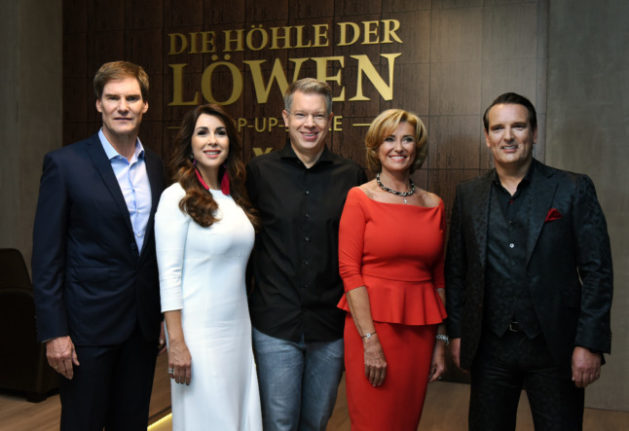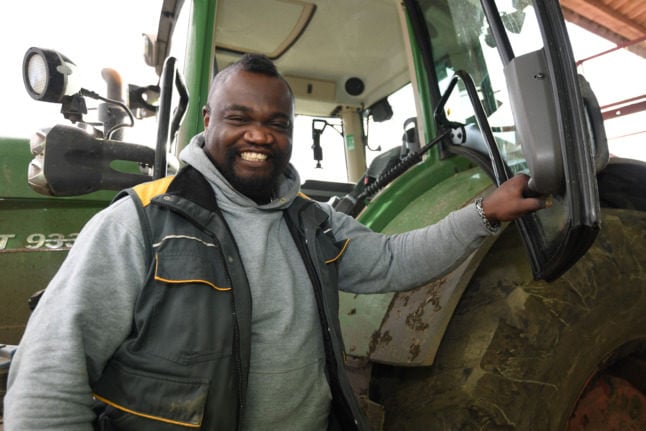The Voice of Germany
For over 10 years, “The Voice of Germany” has been one of the most popular casting shows on German television. Launched with a new “blind audition” concept in 2011, the ProSieben show has consistently brought in high ratings, particularly amongst younger viewers.
In this singing contest, the judges initially sit with their backs to the auditionees so that they can only judge them on the quality of their voice. They can vote for a candidate by pressing a button during their performance to turn their chair toward the stage.
In the current season, British pop star James Blunt surprised the judges with a blind audition of his hit song “Goodbye my Lover”.
Watching this show will broaden your musical vocabulary and ability to critique anyone’s Stimme (voice) and Ton (volume/tone) – but as a bonus, it will also improve your knowledge of German popstars. To get into the mood, you can start by listening to some of the tunes of this season’s judges: Sarah Connor, Johannes Oerding, Nico Santos and Mark Forster.
Höhle der Löwen

The investors on hit German reality TV show ‘Höhle der Löwen’ gather for a press photograph. Photo: picture alliance / Caroline Seidel/dpa | Caroline Seidel
The German version of the British hit show “Dragon’s Den” features lions instead of dragons and invites entrepreneurs to present their business proposals to five wealthy German investors.
The “lions” have included some of Germany’s wealthiest business people over the years, including extreme sportsman and experience-website founder Jochen Schweizer and Formular One champion Nico Rosberg. The investors probe the ideas and business plans of start-up founders, before deciding whether or not to invest.
Earlier this year, the show was the subject of a furious online storm when two entrepreneurs proposed a peculiar menstrual hygiene product, in the form of a rubber glove.
READ ALSO: Two German men face backlash over ‘Pinky’ period glove product
The show is great for broadening your business vocabulary with Umsatz (turnover), Gewinn (profit) and Anteile (shares) being the most prominently featured terms.
LOL: The Last one Laughing

The German stars of the third season of LOL: The Last one Laughing. Photo: picture alliance/dpa/Prime Video | Frank Zauritz
This is a great show for anyone who doesn’t think that Germans have a sense of humour.
In this reality show, ten top German comedians compete against each other in a battle for €50,000 in prize money that’s donated to good cause.
The participants stay in an apartment for six hours and present each other with short performances and the winner is the person who manages not to laugh the longest.
This is definitely a show for those who want to broaden their lexicon with some colourful German phrases – and hopefully make their German friends crack a smile in the process.
READ ALSO: OPINION: Is it true that Germans don’t understand sarcasm?
Bauer sucht Frau

Farmer Keno Veith stands next to his tractor as he searches for true love in an episode of ‘Bauer Sucht Frau’. Photo: picture alliance/dpa | Carmen Jaspersen
In this somewhat old-fashioned dating show, farmers from all over Germany search for their true love.
The show is one of the most popular and long-running German reality TV shows, and has been shown on RTL since 2005.
The farmers – who are usually referred to in the voiceover as either a raubeiniger Rinderwirt (rough-around-the-edges cattle farmer) or schüchterner Schweinebauer (shy pig farmer) – receive written applications from women hoping to be considered as farmer’s wives.
Prospective female farmers are invited to frolic around on the farm, to prove themselves in the field and in the barn and to try to win the heart of the respective farmer.
It may not be the most enlightened of TV shows, but it will do wonders for your agricultural vocabulary.
Ich bin ein Star – Holt mich hier raus!

The 2015 Jungle Queen Maren Gilzer sits on her throne. Photo: picture alliance / dpa | Stefan Menne
Another British import, the German version of “I’m a Celebrity – Get me out of here!” has been delighting German audiences since 2004.
In each season, 10 to twelve German celebrities are shipped to the Australian jungle, where they must compete in Dschungelprüfungen (Bushtucker trials) to win meals for their campmates. Celebrities are voted off by the public and eventually one is crowned the winner, or Dschungelkönig/in (Jungle king or queen).
While it may not help you order in a regular restaurant, the show is great for broadening your exotic culinary vocabulary, as one of its most well-known features is the eating challenge where contestants have to eat a variety of stomach-turning meals to win stars.
Previous episodes have seen stars eating a Käfersaftcocktail (beetle juice cocktail), Ziegenzunge (goat’s tongue) and even a Glas voller Kuh-Urin (Glass full of cow urine). Yummy!



 Please whitelist us to continue reading.
Please whitelist us to continue reading.
Member comments